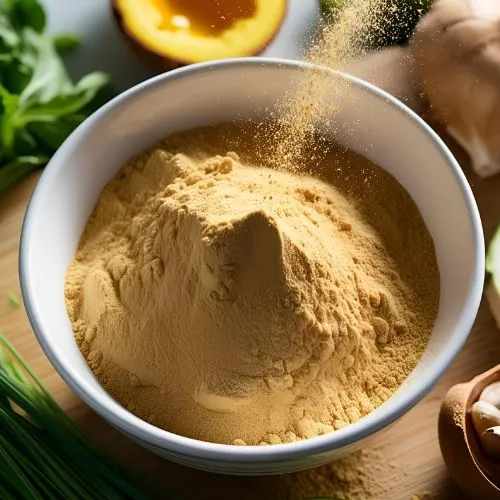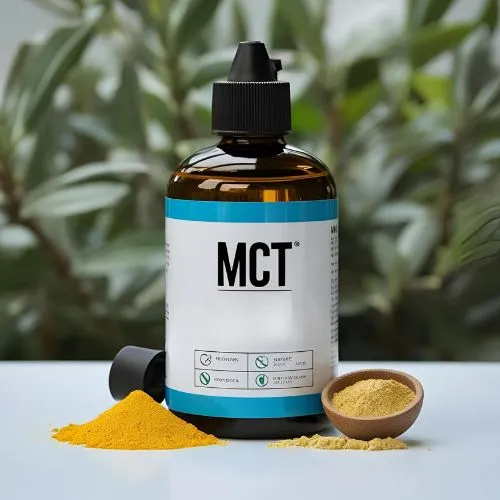Is MCT powder as effective as MCT oil?
Medium-chain triglycerides (MCTs) have gained significant popularity in recent years due to their potential health benefits. Both MCT oil and MCT powder are widely available, but many people wonder if MCT powder is as effective as its liquid counterpart. In this comprehensive guide, we'll explore the similarities and differences between these two forms of MCTs, helping you make an informed decision about which option might be best for your needs.

Comparing MCT Powder and Oil: Which is Better?
When it comes to choosing between MCT powder and MCT oil, it's essential to understand the key differences and similarities between these two forms of medium-chain triglycerides.
Composition and Bioavailability
MCT oil is a pure form of medium-chain triglycerides, typically derived from coconut oil or palm kernel oil. It consists of 100% MCTs, making it a highly concentrated source of these beneficial fats. On the other hand, MCT powder is created by spray-drying MCT oil onto a carrier powder, such as acacia fiber or maltodextrin. This process results in a powder that contains approximately 50-70% MCTs, with the remainder being the carrier substance.
Despite the lower concentration of MCTs in powder form, research suggests that the bioavailability of MCTs from powder is comparable to that of oil. A study published in the Journal of Nutritional Science and Vitaminology found that MCT powder was just as effective as MCT oil in increasing blood ketone levels, indicating similar absorption and utilization by the body.
Convenience and Versatility
One of the main advantages of MCT powder over MCT oil is its convenience and versatility. MCT powder is easier to transport, measure, and incorporate into various foods and beverages. It can be easily added to smoothies, coffee, baked goods, and other recipes without altering the texture or taste as significantly as MCT oil might.
MCT oil, while effective, can be messier to handle and may separate when mixed with cold liquids. Some people also find the oily texture less palatable, especially when consumed on its own or added to beverages.
Digestive Tolerance
For individuals with sensitive stomachs, MCT powder may be a more suitable option. The carrier substance in MCT powder can help slow down the absorption of MCTs, potentially reducing the likelihood of digestive discomfort that some people experience with MCT oil. This gentler absorption process may make MCT powder a better choice for those new to MCTs or those who have experienced gastrointestinal issues with MCT oil in the past.

Top Benefits of Using MCT Powder in Your Diet
Incorporating MCT powder into your diet can offer numerous potential health benefits. Let's explore some of the top advantages of using MCT powder:
Enhanced Cognitive Function
MCTs are known for their ability to quickly convert into ketones, which can serve as an alternative energy source for the brain. A study published in the journal Neuroscience Letters found that MCT supplementation improved cognitive performance in older adults with mild cognitive impairment. By using MCT powder, you may experience improved mental clarity, focus, and overall cognitive function.
Weight Management Support
MCT powder can be a valuable tool for those looking to manage their weight. Research published in the European Journal of Clinical Nutrition suggests that MCTs may increase feelings of fullness and reduce overall calorie intake. Additionally, MCTs have been shown to boost metabolism and promote fat oxidation, potentially aiding in weight loss efforts when combined with a balanced diet and exercise routine.
Improved Athletic Performance
Athletes and fitness enthusiasts may benefit from incorporating MCT powder into their nutrition plan. A study in the Journal of Nutritional Science and Vitaminology found that MCT supplementation improved exercise performance and reduced lactate buildup during high-intensity exercise. By providing a quick and efficient energy source, it may help enhance endurance and recovery for athletes.
Gut Health Support
Emerging research suggests that MCTs may have positive effects on gut health. A study published in the Journal of Nutritional Biochemistry found that MCTs can help modulate the gut microbiome and reduce inflammation in the digestive tract. By incorporating MCT powder into your diet, you may support a healthy gut environment and potentially improve overall digestive function.

Can MCT Powder Boost Ketosis Like MCT Oil?
For those following a ketogenic diet or interested in the potential benefits of ketosis, the question of whether MCT powder can boost ketone production as effectively as MCT oil is crucial.
Ketone Production Comparison
Research indicates that MCT powder can indeed boost ketosis similarly to MCT oil. A study published in the Journal of Nutritional Science and Vitaminology compared the effects of MCT powder and MCT oil on blood ketone levels. The results showed that both forms of MCTs were equally effective in increasing ketone production, suggesting that MCT powder can be just as beneficial for those seeking to achieve or maintain a state of ketosis.
Practical Considerations for Ketogenic Diets
While both MCT powder and oil can support ketosis, the powder form may offer some practical advantages for those following a ketogenic diet. The ease of incorporating it into various foods and beverages makes it simpler to maintain consistent MCT intake throughout the day. This can be particularly helpful for individuals who struggle with the taste or texture of MCT oil or find it challenging to consume larger quantities of oil.
Synergistic Effects with Other Nutrients
MCT powder's versatility allows for easy combination with other keto-friendly ingredients, potentially enhancing its ketogenic effects. For example, mixing it with protein powder or adding it to high-fat smoothies can create a powerful ketone-boosting combination. This synergistic approach may help individuals achieve and maintain ketosis more effectively than using MCT oil alone.
Conclusion
In conclusion, MCT powder has proven to be a highly effective alternative to MCT oil, offering comparable benefits in terms of bioavailability, ketone production, and overall health effects. Its convenience, versatility, and potential for improved digestive tolerance make it an attractive option for many individuals seeking to incorporate MCTs into their diet. Whether you're looking to boost cognitive function, support weight management, enhance athletic performance, or maintain ketosis, it can be a valuable addition to your nutrition plan.
For high-quality MCT powder and other natural plant extracts, consider exploring the offerings from Yangge Biotech Co., Ltd. As a leading provider of innovative, high-quality raw material solutions, Yangge Biotech is committed to meeting the diverse needs of the food and health industries. To learn more about their range of products, including MCT powder, reach out to their team at info@yanggebiotech.com.
FAQ
Q: Can we get some samples to test before purchasing?
A: Of course, we can provide free samples of 20 to 100 grams, but the shipping cost is at the customer's expense. The shipping cost can be deducted from the next order, or the samples can be sent through your courier account.
Q: Do your products have relevant certifications?
A: Yes, our products are certified for HALAL, ISO, HACCP, Kosher, and other certifications.
Q: What is the minimum order quantity (MOQ)?
A: Small batches of samples can be customized according to your requirements.
Q: Do you offer OEM and ODM services? Can the formula be customized based on our own?
A: Of course, we provide ODM and OEM services to many customers. Our product range includes softgels, capsules, tablets, sachets, granules, and private label services. Simply contact us and let us know your requirements. Our experienced R&D team can also develop new products with specific formulas.
Please contact us to design your own branded products.
Q: How do you handle quality complaints?
A: First, we have a comprehensive quality control SOP. We provide authoritative third-party inspection reports for almost all products before shipment to minimize the possibility of quality issues. Second, we have a comprehensive return and exchange procedure. If there is a genuine quality dispute, we will strictly follow the SOP.
Q: How do you ship? How long does delivery take?
A: For small orders, we typically use DHL, UPS, EMS, FedEx, or TNT. Delivery typically takes 3-7 days. We also offer air and sea freight services. We have a strong freight forwarding team and can provide you with a one-stop service, including DDP and DDU.
Q: What are your payment terms?
A: 100% prepayment, payable by T/T, Western Union, MoneyGram, or PayPal.
Q: What is the shelf life of your products?
A: 2 years with proper storage.
Q: Is the packaging environmentally friendly?
A: We attach great importance to environmental protection and are constantly improving our product packaging. Some products are packaged in recyclable paper. Packaging materials are carefully selected to ensure product safety during transportation and storage, and to minimize environmental impact. We are committed to achieving a balance between environmental friendliness and practicality in our product packaging, and to contributing to sustainable development.
References
1. Nosaka, N., et al. (2018). Effect of Ingestion of Medium-Chain Triacylglycerols on Moderate- and High-Intensity Exercise in Recreational Athletes. Journal of Nutritional Science and Vitaminology, 64(5), 357-364.
2. Page, K. A., et al. (2009). Medium-chain fatty acids improve cognitive function in intensively treated type 1 diabetic patients and support in vitro synaptic transmission during acute hypoglycemia. Diabetes, 58(5), 1237-1244.
3. St-Onge, M. P., et al. (2003). Medium-chain triglycerides increase energy expenditure and decrease adiposity in overweight men. Obesity Research, 11(3), 395-402.
4. Rial, S. A., et al. (2016). Gut Microbiota and Metabolic Health: The Potential Beneficial Effects of a Medium Chain Triglyceride Diet in Obese Individuals. Nutrients, 8(5), 281.
5. Vandenberghe, C., et al. (2017). Tricaprylin Alone Increases Plasma Ketone Response More Than Coconut Oil or Other Medium-Chain Triglycerides: An Acute Crossover Study in Healthy Adults. Current Developments in Nutrition, 1(4), e000257.

Based on your location and order quantity, you will have the opportunity to receive a limited time free shipping promotion!

Who we are


